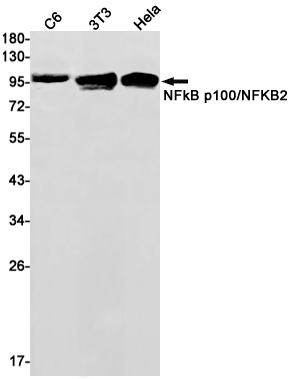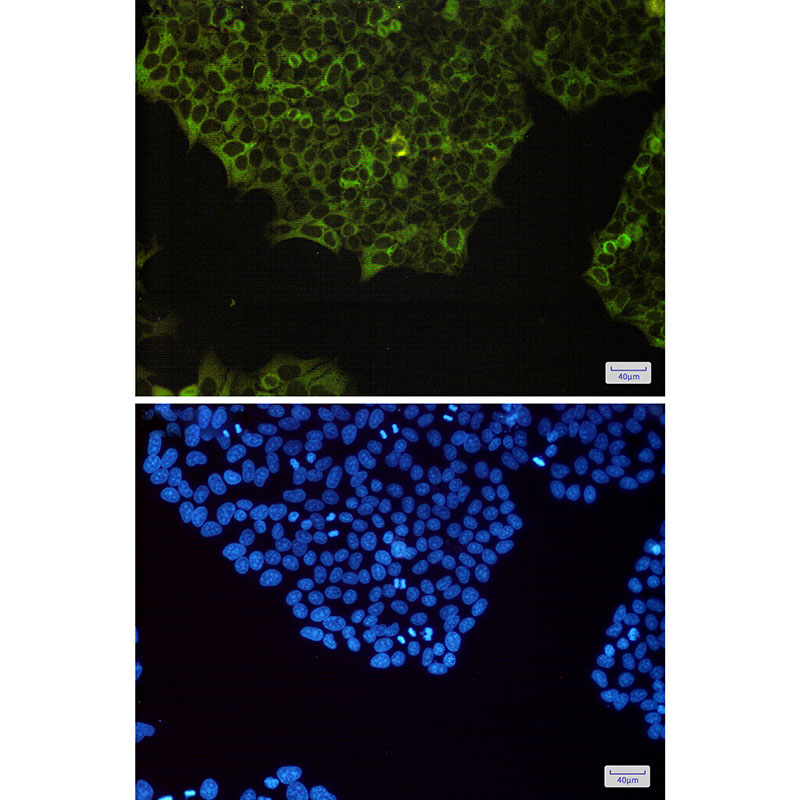

| WB | 1/500-1/1000 | Human,Mouse,Rat |
| IF | 1/20 | Human,Mouse,Rat |
| IHC | 咨询技术 | Human,Mouse,Rat |
| ICC | 1/50-1/200 | Human,Mouse,Rat |
| FCM | 咨询技术 | Human,Mouse,Rat |
| Elisa | 咨询技术 | Human,Mouse,Rat |
| Aliases | NFKB2; LYT10; Nuclear factor NF-kappa-B p100 subunit; DNA-binding factor KBF2; H2TF1; Lymphocyte translocation chromosome 10 protein; Nuclear factor of kappa light polypeptide gene enhancer in B-cells 2; Oncogene Lyt-10; Lyt10 |
| Entrez GeneID | 4791 |
| WB Predicted band size | Calculated MW: 97 kDa; Observed MW: 100 kDa |
| Host/Isotype | Rabbit IgG |
| Antibody Type | Primary antibody |
| Storage | Store at 4°C short term. Aliquot and store at -20°C long term. Avoid freeze/thaw cycles. |
| Species Reactivity | Human,Mouse,Rat |
| Immunogen | Recombinant protein of human NFkB p100 |
| Formulation | Purified antibody in TBS with 0.05% sodium azide,0.05%BSA and 50% glycerol. |
+ +
以下是3篇与NF-κB p100抗体相关的文献摘要信息,基于公开研究整理:
---
1. **文献名称**:*NF-κB p100 is a precursor of active p50 involved in constitutive NF-κB activity*
**作者**:Xiao, G., et al. (2001)
**摘要**:该研究阐明了p100蛋白在非经典NF-κB通路中的加工机制,通过特异性抗体检测p100向p52的蛋白酶体依赖性剪切过程,证明其在基础NF-κB活性调控中的作用。
---
2. **文献名称**:*Regulation of the NF-κB-inducing kinase by TNF receptor-associated factor 3-induced degradation*
**作者**:Liao, G., et al. (2004)
**摘要**:文章利用抗p100抗体进行免疫沉淀和Western blot分析,揭示了TRAF3通过调控NIK稳定性影响p100到p52的加工,从而调节非经典NF-κB通路活性。
---
3. **文献名称**:*Selective activation of NF-κB subunits in human breast cancer*
**作者**:Cogswell, P.C., et al. (2000)
**摘要**:研究通过免疫组化及Western blot使用p100/p52特异性抗体,发现乳腺癌组织中非经典NF-κB通路异常激活,p100加工增加与肿瘤进展相关。
---
**注**:以上信息整合自NF-κB相关研究,若需具体文献全文或DOI,建议通过PubMed或Web of Science以关键词(如"NF-κB p100 antibody")检索最新或高引论文。实际引用时请核对作者、年份及期刊准确性。
The NF-κB p100 antibody is a research tool designed to detect the p100 protein, a key component of the NF-κB (nuclear factor kappa-light-chain-enhancer of activated B cells) signaling pathway. The p100 protein, encoded by the *NFKB2* gene, serves as a precursor to the active subunit p52 through regulated proteasomal processing. It belongs to the NF-κB/Rel family, which regulates genes involved in immune responses, inflammation, cell survival, and proliferation. Unlike the canonical NF-κB pathway (e.g., p50/p65), the non-canonical pathway involving p100/p52 is activated by specific receptors like CD40. BAFF, or lymphotoxin-β, triggering NIK (NF-κB-inducing kinase)-dependent phosphorylation and partial degradation of p100 to release p52. This pathway is critical in B-cell development, lymphoid organogenesis, and adaptive immunity.
Antibodies targeting p100 are widely used in techniques like Western blotting, immunofluorescence, and immunohistochemistry to study its expression, processing, and subcellular localization. Researchers employ these antibodies to investigate dysregulated NF-κB signaling in diseases such as cancers, autoimmune disorders, and chronic inflammation. Since p100 is constitutively expressed in the cytoplasm and requires processing for nuclear translocation, the antibody helps distinguish between inactive (p100) and active (p52) states, providing insights into pathway activation. Specificity validation (e.g., knockout controls) is essential due to structural similarities with other NF-κB proteins like p105 (precursor of p50). Overall, the p100 antibody is vital for dissecting non-canonical NF-κB signaling mechanisms in health and disease.
×